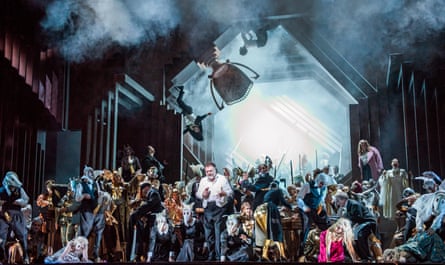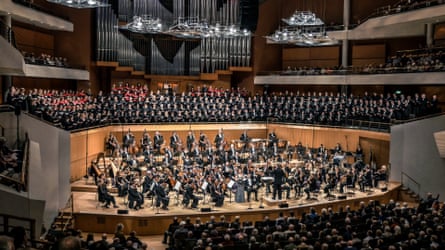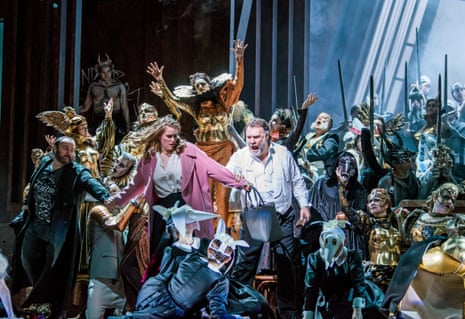A myriad of concertina folds, fluted facades and slatted wood, the set for the Royal Opera’s new Die Meistersinger von Nürnberg, stole the show or rather, nearly killed it. Had musical standards, under the supreme baton of Antonio Pappano and starring the bass baritone Bryn Terfel as the cobbler-poet Hans Sachs, not been so bristling, alive and compelling, it might have succeeded. No toy-town medievalism here for Wagner’s troubled comedy. This Meistersinger has the look of an airless art deco mausoleum, a place in which to bury obsolete traditions with maximum ritual and, if you have the courage, face up to change. Kasper Holten’s final production as director of opera at Covent Garden made a statement, not always comprehensible or sensible but undeniably grand.
After an insecure prelude, the orchestra settled into a magnificent performance, beautifully paced by Pappano, with the musicians seemingly tireless across the five hours’ duration. They never overwhelmed the singers. What a communal effort. Choruses resounded, the great quintet blazed, the Prize Song deserved that winning title. But who are the characters, where are they, what story are they telling? If a staging answers these questions, there is hope that the audience will follow. By Act 2, long before the riot which closes that act, the compass was spinning. By the third and last, the set was revolving too, albeit in very slo-mo. Tradition by now is an empty husk, the song contest central to the plot mere pageantry. Holten thinks hard and with care. His time at the Royal Opera has been an exhilarating gallop. His seriousness and amiability are not in doubt. There are moments in this Meistersinger of such integrity that the insuperable problems of the staging almost retreat. Almost.
Designed by Mia Stensgaard (with costumes by Anja Vang Kragh and lighting by Jesper Kongshaug), action has been updated to a gentlemen’s club. It might be Germany 1933, or Freemasons’ Hall, Covent Garden, built that same year. It bears a spooky resemblance, with its dark, receding enfilades interrupted by shafts of light, to the painting by Hitler that went on show for the first time in Italy last week (“crap”, as one curator described it). There is, however, no reference at the Royal Opera House to Nazis or antisemitism. This hymn to German art is delivered without irony, a reflection of Wagner’s era. (The opera was premiered in 1868, Germany unified as an empire in 1871.) Beckmesser the town clerk, dolefully and winningly played by Johannes Martin Kränzle, a veteran in the role, had no obvious characteristics beyond narcissism and pathos.
Costumes are generic modern. Magdalene (Hanna Hipp, enchanting but occluded by the staging) wears a headset in her role as events manager. Guild aprons and insignia are the men’s dressing-up clothes of choice, exchanged for easy-iron suits. A choir rehearses for the midsummer festivities – giving ROH chorus director William Spaulding a walk-on role, to “train” his already superb choral forces. With towering floral displays, plinths, dining tables with glassware, candles and starched napery, the stage is clogged. Given the monumentality of the set it was inevitable that it would remain in situ throughout. Allan Clayton, one of the most versatile younger tenors around, made lovely comic impact as the apprentice David, but would that he had been allowed more space for his big Act 1 aria. Stephen Milling (Pogner), Sebastian Holecek (Kothner) and, untroubled at being got up as a cloven-hoofed satyr, David Shipley (Nightwatchman) added strength to the ensemble cast.

Terfel as Sachs and Gwyn Hughes Jones as the new arrival Walther von Stolzing – Welshmen both – repeat roles they played triumphantly in Richard Jones’s 2010 staging for Welsh National Opera (later seen at English National Opera). Here their singing is once again gloriously rewarding, their wooing of Eva (Rachel Willis-Sørensen, golden-voiced if inscrutably portrayed) persuasive. Their characters are more muted in Holten’s production. This Walther, more of an old rocker and decidedly lacking dress sense, sings radiantly, but you can see why, once he joins the master singers and puts on that ridiculous square cake of a hat, Eva might have second thoughts. Sachs, noble in viridian, is surely a better bet. With all his majesty and despair, his flawed wisdom, Sachs is Wagner’s greatest role. It’s also a huge sing. Terfel delivered a performance of acuity, perception and fine judgment. The moment at which he picks up a newspaper and cries out “Wahn!” – madness, folly – is all too chilling. Especially this past week.
Wagner and Elgar have more in common than might be thought. The links are chiefly artistic rather than musical. Wagner’s Parsifal perhaps liberated Elgar, who saw it in Bayreuth, to write his own epic study of sickness and death. The Dream of Gerontius (1900) is one of the finest choral edifices in the English language, with complex orchestral writing on a symphonic scale. Elgar used the text of Cardinal Newman’s 1865 poem, scented with the language of Anglo-Catholic religiosity with Dante splashed in, but a powerful examination of a man dying and encountering the life hereafter.

Mark Elder concluded his short Elgar festival with Gerontius, performed in Manchester by his excellent Hallé Orchestra and choirs (broadcast on 20 March on Radio 3). To a packed Bridgewater Hall, every participant played or sang their hearts out. And there were hundreds of them: well over 200 choral members, with the boys of the youth choir sounding especially vigorous. The climactic Praise to the Holiest, in which all combine in massive union, made the air move. “This is the best of me,” Elgar wrote at the bottom of his Gerontius score. It was, too, the best of tenor David Butt Philip, mezzo-soprano Sasha Cooke, bass-baritone Iain Paterson (also, for ENO, a great Hans Sachs), the Hallé choir, youth choir and orchestra. Mark Elder looked ghost-white by the end, as if he had lived every moment of Elgar’s heavenly journey, fortunately returning to earth to hear the wild applause.
Star ratings (out of 5)
Die Meistersinger von Nürnberg ★★★
The Dream of Gerontius ★★★★★
Die Meistersinger von Nürnberg is in rep at the Royal Opera House, London until 31 March

Comments (…)
Sign in or create your Guardian account to join the discussion